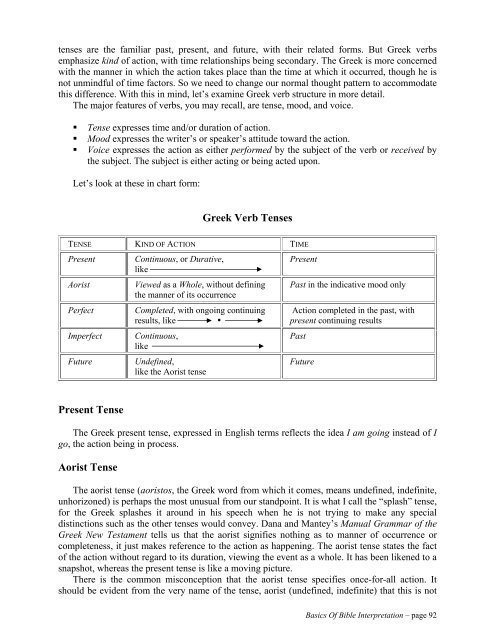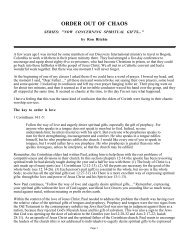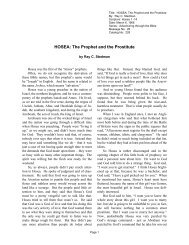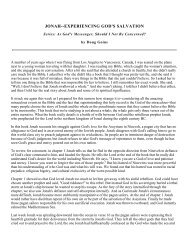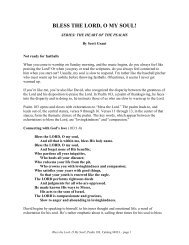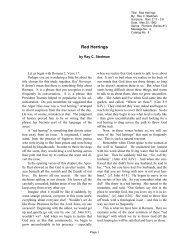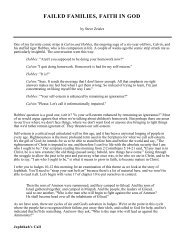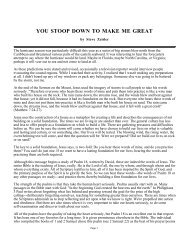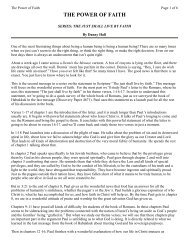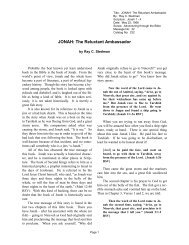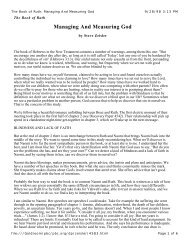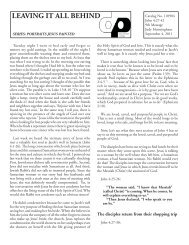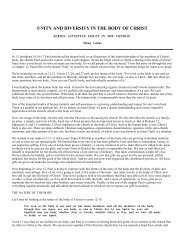Basics of Bible Interpretation - RayStedman.org
Basics of Bible Interpretation - RayStedman.org
Basics of Bible Interpretation - RayStedman.org
Create successful ePaper yourself
Turn your PDF publications into a flip-book with our unique Google optimized e-Paper software.
tenses are the familiar past, present, and future, with their related forms. But Greek verbs<br />
emphasize kind <strong>of</strong> action, with time relationships being secondary. The Greek is more concerned<br />
with the manner in which the action takes place than the time at which it occurred, though he is<br />
not unmindful <strong>of</strong> time factors. So we need to change our normal thought pattern to accommodate<br />
this difference. With this in mind, let’s examine Greek verb structure in more detail.<br />
The major features <strong>of</strong> verbs, you may recall, are tense, mood, and voice.<br />
• Tense expresses time and/or duration <strong>of</strong> action.<br />
• Mood expresses the writer’s or speaker’s attitude toward the action.<br />
• Voice expresses the action as either performed by the subject <strong>of</strong> the verb or received by<br />
the subject. The subject is either acting or being acted upon.<br />
Let’s look at these in chart form:<br />
Greek Verb Tenses<br />
TENSE KIND OF ACTION TIME<br />
Present<br />
Aorist<br />
Perfect<br />
Imperfect<br />
Future<br />
Continuous, or Durative,<br />
like<br />
Viewed as a Whole, without defining<br />
the manner <strong>of</strong> its occurrence<br />
Completed, with ongoing continuing<br />
results, like •<br />
Continuous,<br />
like<br />
Undefined,<br />
like the Aorist tense<br />
Present<br />
Past in the indicative mood only<br />
Action completed in the past, with<br />
present continuing results<br />
Past<br />
Future<br />
Present Tense<br />
The Greek present tense, expressed in English terms reflects the idea I am going instead <strong>of</strong> I<br />
go, the action being in process.<br />
Aorist Tense<br />
The aorist tense (aoristos, the Greek word from which it comes, means undefined, indefinite,<br />
unhorizoned) is perhaps the most unusual from our standpoint. It is what I call the “splash” tense,<br />
for the Greek splashes it around in his speech when he is not trying to make any special<br />
distinctions such as the other tenses would convey. Dana and Mantey’s Manual Grammar <strong>of</strong> the<br />
Greek New Testament tells us that the aorist signifies nothing as to manner <strong>of</strong> occurrence or<br />
completeness, it just makes reference to the action as happening. The aorist tense states the fact<br />
<strong>of</strong> the action without regard to its duration, viewing the event as a whole. It has been likened to a<br />
snapshot, whereas the present tense is like a moving picture.<br />
There is the common misconception that the aorist tense specifies once-for-all action. It<br />
should be evident from the very name <strong>of</strong> the tense, aorist (undefined, indefinite) that this is not<br />
<strong>Basics</strong> Of <strong>Bible</strong> <strong>Interpretation</strong> – page 92


